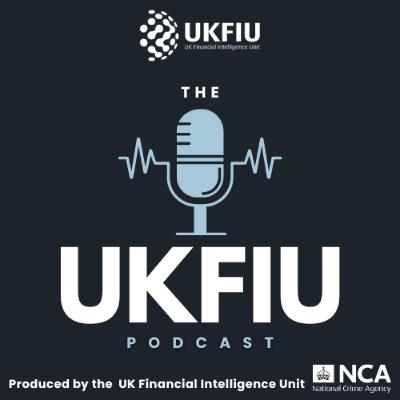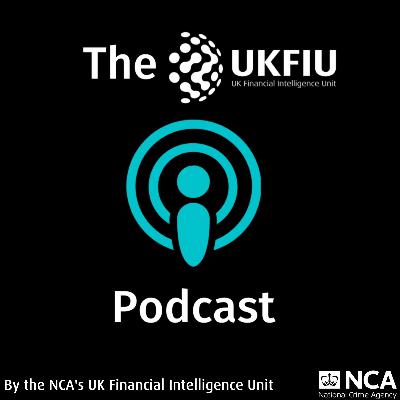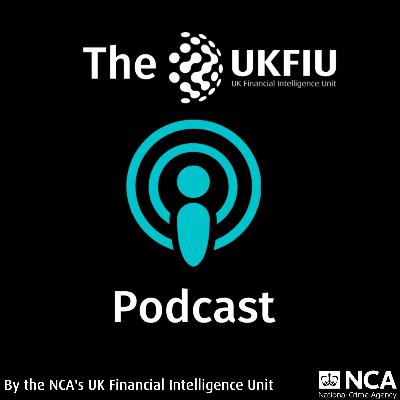Discover The UKFIU Podcast
The UKFIU Podcast

The UKFIU Podcast
Author: UK Financial Intelligence Unit
Subscribed: 91Played: 988Subscribe
Share
© UK Financial Intelligence Unit
Description
The UK Financial Intelligence Unit (UKFIU), housed within the National Crime Agency, has national responsibility for receiving, analysing and disseminating financial intelligence submitted through the Suspicious Activity Reports (SARs) regime. SARs alert law enforcement to potential instances of money laundering and terrorist financing and are a vital source of intelligence, not only on economic crime but on a wider range of criminal activity.
These educational podcasts are part of the UKFIU’s new digital presence delivering a smarter approach to fighting crime, in line with UKFIU priorities of reducing harm, protecting the integrity of the UK economy and ensuring that there are no safe spaces for economic crime or terrorism financing.
These educational podcasts are part of the UKFIU’s new digital presence delivering a smarter approach to fighting crime, in line with UKFIU priorities of reducing harm, protecting the integrity of the UK economy and ensuring that there are no safe spaces for economic crime or terrorism financing.
27 Episodes
Reverse
In this episode, panellists from the National Economic Crime Centre (NECC) and legal sector discuss the issue of Payment Diversion Fraud (PDF) in the legal sector, with a specific focus on legal professionals involved in conveyancing. This includes how PDF can impact the legal profession, and the collaboration and work of this sector and law enforcement in minimising and combatting this crime. NECC PDF factsheet - https://www.nationalcrimeagency.gov.uk/who-we-are/publications/764-payment-diversion-fraud-infosheet For the subtitled version of this episode go to: https://youtu.be/zzPkLb_VXNQ
WARNING: This post contains references to child sexual abuseIn this episode, panellists from the National Crime Agency (NCA) and NatWest Group discuss Child Sexual Abuse (CSA) livestreaming. This includes the actions being taken by law enforcement and reporters to combat this crime, potential indicators, and how to report if you have suspicions of CSA or money laundering linked to CSA.For the subtitled version of this episode go to: https://youtu.be/z_FVVGoZNok Reporting child sexual abuseIf you are concerned that a child is at immediate risk of harm, call 999.Concerns of child sexual abuse should be reported to Police by calling 101.Under 18 year olds can also report online sexual abuse or grooming to the National Crime Agency’s CEOP Safety Centre: www.ceop.police.uk Support servicesUnder 18 year olds can talk to Childline confidentially, at any time, by calling 0800 1111 or chat online to a counsellor by visiting www.childline.org.uk/get-support/contacting-childline/Adults who experienced sexual abuse as child and would like to talk to someone about it can contact the National Association for People Abused in Childhood on 0808 801 0331 or by visiting https://napac.org.ukSurvivors UK runs the National Male Survivors Online Helpline – a webchat and SMS service for men, boys and non-binary people who have experienced sexual abuse at any time in their lives. www.survivorsuk.org/ways-we-can-help/If you are concerned about your own sexual thoughts, feelings or behaviour towards children, speak in confidence to Stop It Now by visiting www.stopitnow.org.uk or contacting their confidential helpline on 0808 1000 900
In this episode, panellists from the UK Financial Intelligence Unit (UKFIU) and Crown Prosecution Service (CPS) discuss the UK’s assumption of the CARIN presidency, the role of CARIN and the processes of UKFIU and CARIN in working with law enforcement in UK and CARIN member states.CARIN - Camden Asset Recovery Inter-agency NetworkARIN – Asset Recovery Inter-agency NetworkFATF – Financial Action Task ForceMLA – Mutual Legal AssistanceILOR – International Letter of RequestUKCA – UK Central AuthorityFor the subtitled version of this episode go to: https://youtu.be/zZmPCR3jBtc
Episode 24Organised Immigration Crime: Illicit FinanceIn this episode, panellists from the National Crime Agency (NCA) address the illicit finance angle of Organised Immigration Crime (OIC). Panellists explain the current threat picture, how Informal Value Transfer Systems (IVTS) play a role in enabling this crime and the actions being taken by the NCA to disrupt organised crime groups involved in OIC.Read the special OIC SARs in Action issue - https://bit.ly/465AS37 OIC - Organised Immigration CrimeMSHT - Modern Slavery Human Trafficking IVTS - Informal Value Transfer Systems MLRs - Money Laundering RegulationsKRI - Kurdistan Region of IraqJMLIT – Joint Money Laundering Intelligence TaskforceMSB – Money Service BusinessFor the subtitled version of this episode go to: https://www.youtube.com/watch?v=ibH5650JxXQ
In this episode, this issue of virtual squatting is discussed by panellists from the National Economic Crime Centre (NECC), Institute of Chartered Accountants in England and Wales (ICAEW) and Companies House. Panellists address what is virtual squatting and the role it plays in economic crime, potential signs that professionals should be aware of, and the positive outcomes that resulted from public-private partnership.JMLIT – Joint Money Laundering Intelligence TaskforceICAEW – Institute of Chartered Accountants in England and WalesSAR – Suspicious Activity ReportEDD – Enhanced Due DiligenceFor the subtitled version of this episode go to: https://www.youtube.com/watch?v=9ORYT3HHqDg
In this episode, panellists from the Egmont Group and the UK Financial Intelligence Unit’s (UKFIU’s) International team discuss the role of international collaboration in combatting money laundering and terrorist financing. Egmont plays a key role in facilitating UKFIU cooperation with other Financial Intelligence Units and in turn, the UKFIU aims to contribute to the success of the group. Topics discussed include an overview of the structure and role of the Egmont group by the group’s chair, Elżbieta Franków-Jaśkiewicz, the projects the UKFIU has been involved in, and the future strategic goals of the Egmont Group.AML – Anti-Money LaunderingCFT – Combatting Financing for TerrorismEC – Egmont CommitteeECOFEL - Egmont Centre of FIU Excellence and LeadershipEGS - Egmont Group SecretariatESW – Egmont Secure WebFor the subtitled version of this episode go to: https://www.youtube.com/watch?v=u_3HOAfK-g4
In this episode, our panellists discuss the issue of professional enablers. Jacquie Griffiths (OPBAS), Edgars Pastars (Finance Latvia Association), and Tommas Kaplan (von Poll Immobilien) provide an overview of the challenges sectors encounter and their views on what professionals should consider when de-risking. This includes examples from their own work when encountering those attempting to launder the proceeds of crime and their response to avoid becoming a professional enabler.AML – Anti-Money LaunderingCFT – Combatting the Financing of TerrorismOPBAS – Office for Professional Body Anti-Money Laundering SupervisionFATF – Financial Action Task ForceDNFBPs – Designated Non-Financial Businesses and ProfessionsFIU – Financial Intelligence UnitPBS – Professional Body SupervisorFor the subtitled version of this episode go to: https://www.youtube.com/watch?v=HObWhq7zGws
In this episode, panellists discuss the recent work that has been done on illicit company formation activity and transformations to Companies House following legislative changes.
These representatives from the National Economic Crime Centre (NECC), Companies House, and private sector members of the NECC’s public private partnerships share their perspectives on this work, including its relation to Suspicious Activity Reports (SARs).
Please note the figures provided by Companies House
were accurate at the time of recording.
TCSP – Trust or Company Service Providers
SAR – Suspicious Activity Reports
PPP – Public-Private Partnership
BAU – Business As Usual
For a subtitled version of this episode visit: https://youtu.be/58ClkXN7I60
In this episode our panel of legal experts discuss key considerations and challenges facing legal professionals when it comes to anti-money laundering (AML) and suspicious activity reporting. The legal sector covers everything from large global firms down to sole practitioners and our panellists discuss key money laundering threats, risk areas and the indicators which firms and sole practitioners should be looking for.
For the subtitled version of this episode go to: https://youtu.be/FztrHRW0-7U
SRA – Solicitor’s Regulation Authority
MLRO- Money Laundering Reporting Officer
AML – Anti-money laundering
WTW – Willis Towers Watson
FCA – Financial Conduct Authority
CDD – Customer Due Diligence
OFSI – Office of Financial Sanctions Implementation
Further information can be found here:
https://sra.org.uk/aml
https://sra.org/sanctions
https://www.lawscot.org.uk/members/regulation-and-compliance/financial-compliance/anti-money-laundering/
https://www.lawscot.org.uk/news-and-events/law-society-news/aml-thematic-review-of-suspicious-activity-reports/
https://lawsociety.org.uk/topics/anti-money-laundering/
https://wtwco.com/en-gb
In part two of our Illegal Wildlife Trade (IWT) episode, our panellists discuss the impact on economies, biodiversity and legitimate wildlife trade. They also talk about predicate crimes associated with IWT and the importance of international co-operation, such as that garnered during Project Anton, in tackling it.
Information regarding the Statement of Principles, announced by the Prince of Wales at the United for Wildlife Global Summit in November, can be found here: https://unitedforwildlife.org/news/international-statement-of-principles-announced
For the subtitled version of this episode go to: https://youtu.be/aLQzDjlxApg
In part one of our episode on the Illegal Wildlife Trade (IWT), we are joined by panellists from Canada’s Financial Transactions and Reports Analysis Centre (FINTRAC) and the UK’s National Wildlife Crime unit (NWCU). Our panellists discuss the roles of their organisations and outline the differing threats between their respective countries, but highlight the similar typologies used by serious organised crime groups.
Reporters can access key messages and information on IWT related SARs using the following link: https://fintrac-canafe.canada.ca/intel/operation/oai-wildlife-eng
For the subtitled version of this episode go to: https://youtu.be/TRM4kvKaypQ?si=C6USuBOOJ-bbTCPz
In this episode, panellists from accountancy sector supervisory bodies discuss Anti-Money Laundering (AML) compliance within the sector. This includes specific cases where a firm may have AML concerns during Know Your Customer (KYC) and Suspicious Activity Report (SAR) practices. The panellists use their extensive knowledge to provide their perspectives on the sector as a whole and specifics relating to their areas of focus, from large accountancy firms to individual bookkeepers. There is also information on opportunities for firms to approach the UKFIU’s Reporter Engagement Team (RET) to improve internal understanding of SARs submission.
For the subtitled version of this episode go to: https://youtu.be/D0xYmNQsylA
Panellists:
Tim Pinkney, Director of Professional Standards, Institute of Financial Accountants (IFA) [formerly Head of Practice Standards]
Michelle Giddings, Head of AML and Operations, Professional Standards, Institute of Chartered Accountants in England and Wales (ICAEW)
Jody Newman, Head of Compliance and Professional Standards, Institute of Accountants and Bookkeepers (IAB)
Acronyms used in this podcast:
PBS: Professional Body Supervisors
AASG: Accountancy AML Supervisors Group
Regs: Regulations
POCA: Proceeds of Crime Act (2002)
KYC: Know Your Customer
CDD: Customer Due Diligence
Time Stamps
00:40 Introduction
01:34 Tim (IFA) intro
02:30 Michelle (ICAEW) intro
03:54 Jody (IAB) intro
05:17 key money laundering threats and red flags
10:32 SAR submission numbers in the accountancy sector
15:27 When turning away a client due to AML or KYC concerns
17:55 Biggest challenges firms face with AML compliance and SARs
23:37 Firm opportunities to engage with the UKFIU.
24:34 Final key messages
27:48 Outro
In this episode, panellists from the National Crime Agency (NCA) and National Economic Crime Centre (NECC) discuss the issue of money mules, including key indicators of money muling, types of money mules and strategies used to recruit potential money mules.
For the subtitled version of this episode go to: https://youtu.be/bTSKvCIYq90
Acronyms used in this podcast:
SARs: Suspicious Activity Reports
Time Stamps:
00:11 Introduction
01:09 Money muling explanation
02:27 Money mule account explanation
04:19 How big a problem is money muling and how much is laundered via this?
06:28 Types of money mule account holders
09:31 How are money mules recruited?
11:08 The demographics of money mules
12:49 The difficulty in disrupting money muling
15:13 Key money mule indicators for SAR reporters to watch out for
18:34 Closing statement
In this episode, panellists from the National Crime Agency (NCA) and UAE Financial Intelligence Unit (UAEFIU) discuss the nature of MSBs and exchange houses in the UK and UAE, the risks of money laundering associated with both sectors, patterns of criminality, how this type of financial service has changed and why there is still a need for them in an increasingly cashless world.
For the subtitled version of this episode go to: https://youtu.be/zSHK63hIugU
Acronyms used in this podcast:
MSB: Money service bureau or money service business
SME: Subject-matter expert
SARs: Suspicious Activity Reports
AML: Anti-money laundering
CFT: Combatting financing of terrorism, or CTF (counter-terrorist
financing)
STR: Suspicious Transaction Report
HOSSP: A report published by the Financial Action Task force
(FATF) on ‘the role of Hawala and other similar service providers in money
laundering and terrorist financing’
IVTF: Informal value transfer system
IBAN: International bank account number
EMI: Electronic Money Institutions
Time Stamps
00:07 Introduction
00:55 MSB’s explanation
03:05 Hawala explanation
04:12 How does this differ to an exchange house within the UAE?
04:51 What steps have been taken to identify financial crime through suspicious activity reporting in the UK?
06:16 What steps have been taken to identify financial crime through suspicious activity reporting in the UAE?
09:45 What are some of the key areas of concerns regarding these areas of financial services?
11:50 What concerns does the UAE have around Hawala type services?
12:30 Patterns of criminality associated with MSBs in the UK
14:32 Patterns of criminality associated with Exchange Houses in the UAE
19:12 Why is there a need for MSBs or Exchange Houses in an increasingly cashless world? Do the benefits to customers outweigh the challenges to law enforcement or regulators?
22:38 Conclusion
We continue our series of podcasts focused on fraud. In this podcast we will be looking at fraud intensification. In 2022 the National Economic Crime Centre (NECC) with assistance from the City of London Police, implemented a period of intensification of activity across law enforcement. There were a number of objectives of this intensification: to increase public confidence that law enforcement is committed to tackling fraud offending in the UK; to act as a deterrent through the promoting of successful initiatives to arrest or interview under caution suspects of fraud; to seize the proceeds of fraud and repatriate money to victims; and to increase confidence across government in law enforcements commitment to tackling fraud.
To explain this work further, we hear from Oliver Little, the Deputy Head of Operations in the NECC on what is ‘intensification’ in this context and how does it apply to work aimed at combatting fraud.
This is the second podcast of a special series of UKFIU podcasts focused on fraud.
00:00 Introduction
01:41 Explaining fraud intensification
02:55 How much victims lose annually as a result of this criminality
04:19 Who are the partners in this intensifications work and how exactly do you all work together
05:43 What the intensification of fraud activity actually entails and what was the outcome of this intensification period
07:49 How has the anti-fraud message been delivered to the general public
09:24 Intensification work planned for 2023
11:22 Conclusion
Fraud Communications
Fraud accounts for over 40% of all crime and recent statistics have shown that 1 in 15 people are a victim of fraud. To facilitate a coordinated response to tackling this, a framework has been developed by key partners, based on insight from across various sectors, to create a streamlined, comprehensive approach. It is hoped that by having a consistent and comprehensive response to fraud, the public will be empowered to protect themselves and to act appropriately if they are targeted. To explain what this all means, we speak with Jessica Kenny, a Strategic Engagement Manager in the National Crime Agency.
This is the first of a special series of UKFIU podcasts focused on fraud.
00:00 Introduction
01:29 Explaining the fraud communications toolkit
04:40 Core behaviours
08:01 The need for consistent fraud messaging
09:34 Methods of communication
12:46 Who is the toolkit aimed at?
13:50 Promoting behavioural change
16: 50 Conclusion
As the number of choices available to banking customers in the UK has grown to include non-traditional platforms, the pool of institutions that regularly report SARs has expanded and diversified. Terms such as ‘challenger bank’, ‘digital bank’, ‘FinTech’, ‘e-wallet’, ‘e-money’ and ‘cryptocurrency exchange’ are now commonplace within the SARs regime and the terminology used to discuss these reporters can be crucial to understanding the different services that they offer.
In this podcast, we chat with Mike Venn, the Group Head of Risk and Compliance with Modulr to try and get a better understanding of this area.
00:00 Introduction
01:23 Modulr introduction
03:21 Emerging, mobile-based firms
05:44 Clarification of services offered
07:11 Know Your Customer (KYC)
09:45 Identifying suspicious activity
12:05 Interaction with the UKFIU
14:03 Conclusion
Resources mentioned in this podcast
UKFIU pages on the NCA website:
https://nationalcrimeagency.gov.uk/what-we-do/crime-threats/money-laundering-and-illicit-finance/suspicious-activity-reports
https://nationalcrimeagency.gov.uk/what-we-do/crime-threats/money-laundering-and-illicit-finance/ukfiu
SARs In Action magazine issue 18:
https://nationalcrimeagency.gov.uk/who-we-are/publications/625-sars-in-action-december-2022/file
In this edition we speak with the National Wildlife Crime Unit, examining the illegal wildlife trade (IWT) and how red flags can be potentially identified through Suspicious Activity Reports. IWT is a significant business, long reported as being the fourth largest crime in the world, and believed to generate approximately GBP 15 billion a year.
Episode 9 looks at how the UKFIU works with overseas partners, ensuring that intelligence on money laundering and financial crime is effectively shared with international partners and includes John O’Sullivan (UKFIU International manager) and USA ILO Mike Manley as panellists. Topics discussed are:
· Demystifying some of the UKFIU international terms used in the SARs Annual Reports
· Intelligence sharing with global partners
· An explanation of the ILO network
· Close working between the UK and US
· How the ILO network works with the UKFIU
· Why SARs are so important to the ILO work
· Why sharing financial intelligence internationally is so important
In this edition we examine virtual assets – what they are, how they work, complexities faced by law enforcement and the role SARs and reporters can play. We hear from the NECC, the National Police Chiefs’ Council cybercrime programme and the reporting sector, and examine the impact of the fifth money laundering directive regulations on SARs regime stakeholders. Note: value based analysis of cryptocurrency/virtual assets referenced in the podcast was accurate at the time of recording.
For the subtitled version of this episode go to: https://www.youtube.com/watch?v=5Jjf9JBWllk&list=PLvYg7_Lx5KSovJ8R2OTP29a_P2ezxR1iy&index=8








